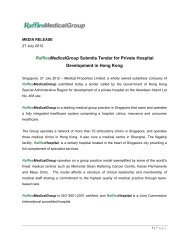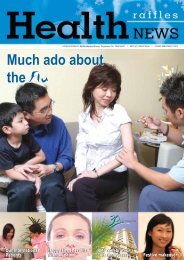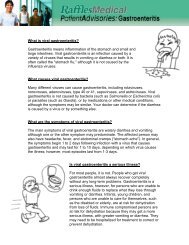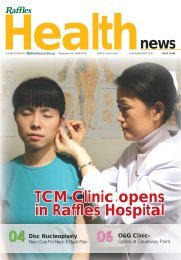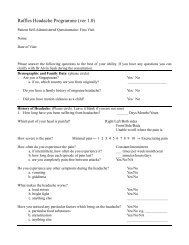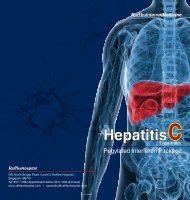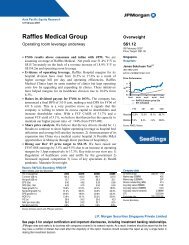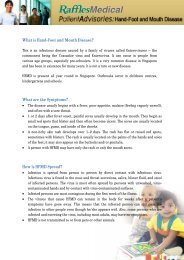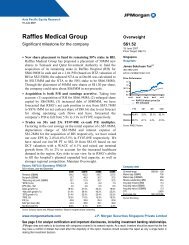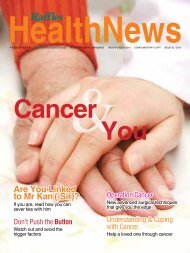REGISTRATION No. 198901967K MICA (P) - Raffles Medical Group
REGISTRATION No. 198901967K MICA (P) - Raffles Medical Group
REGISTRATION No. 198901967K MICA (P) - Raffles Medical Group
Create successful ePaper yourself
Turn your PDF publications into a flip-book with our unique Google optimized e-Paper software.
<strong>Raffles</strong> HealthNews Feature <br />
Going on a vacation soon <strong>No</strong> matter which destination it is, one thing that<br />
tags closely along with you is your health. You probably have heard people<br />
talk about getting vaccinated before travelling, especially to Third World<br />
countries. Do you understand the importance of it and take necessary<br />
precautions while travelling, or do you think that chances of you acquiring<br />
a viral infection are much lower than anyone else<br />
How to Protect Yourself<br />
Consult your doctor four to six weeks before your trip about<br />
suitable vaccinations required and special health concerns of<br />
those places you will be visiting. As most vaccines require time<br />
to become effective, and some require more than one shot, this<br />
will also allow ample time for your body to develop full immunity<br />
from it.<br />
Depending on your health conditions and the country you are<br />
travelling to, the potential risk of diseases varies. Dr Leong<br />
recommends the following precautionary tips and the primary<br />
list of vaccinations that one should consider acquiring.<br />
Protect Yourself with Vaccinations<br />
Primary list of vaccinations against:<br />
• Influenza<br />
• Tetanus, Diptheria, acellular Pertussis (Tdap)<br />
Tetanus is a disease that infects the body through a deep<br />
wound. Diptheria primarily affects the lining of the mucous<br />
membrane of the throat and other respiratory passages,<br />
while Pertussis is also known as the “whooping cough”.<br />
• Hepatitis A<br />
Protect Yourself by Taking Precautions<br />
• Drink bottled water.<br />
• If in doubt, rinse your mouth only with bottled water.<br />
• Avoid uncooked food (e.g salads, shellfish).<br />
• Avoid eating food from roadside stalls.<br />
• Avoid going close to animals. Most of them contain ticks<br />
that may jump onto you.<br />
• Carry a first aid kit equipped with basic medication for<br />
fever, headaches, stomach upset and external wounds.<br />
• You can obtain useful information such as precautions<br />
and vaccinations to acquire, for travelling to a particular<br />
country at www.cdc.gov/travel.<br />
• If you are travelling to an area infested with mosquitoes,<br />
do consider malaria prophylaxis and the use of DEET<br />
(N,N-Diethyl-meta-toluamide) of at least 15%.<br />
The latter is a potent anti-mosquito agent proven to<br />
reduce mosquito bites. Mosquitoes may transmit different<br />
types of infection, notably Dengue Fever, Yellow Fever<br />
and Chikungunya in our region. HN



